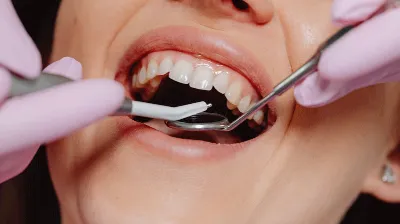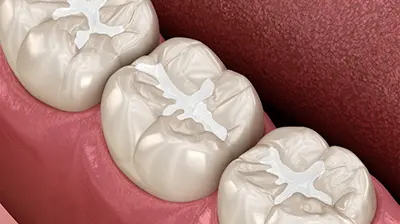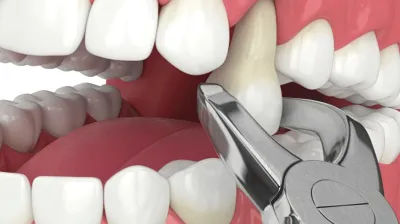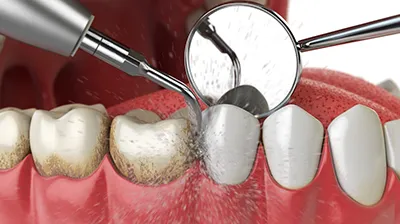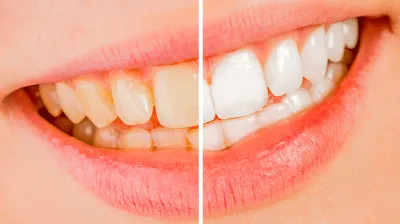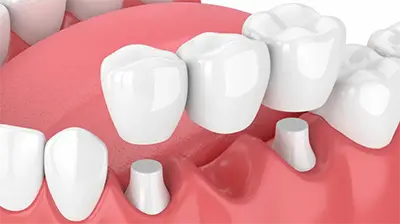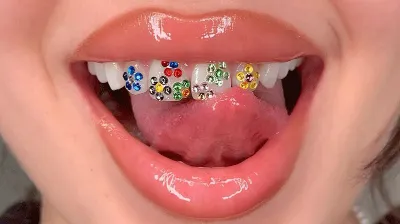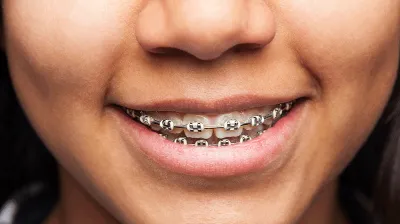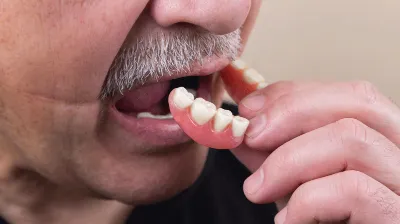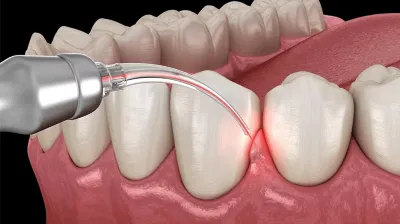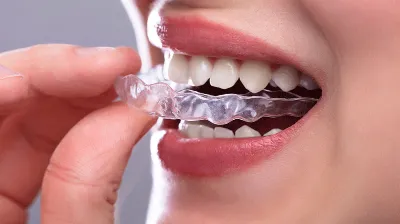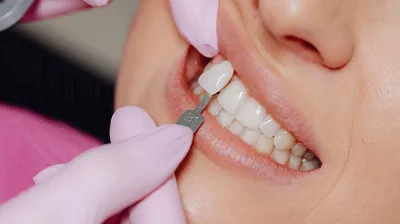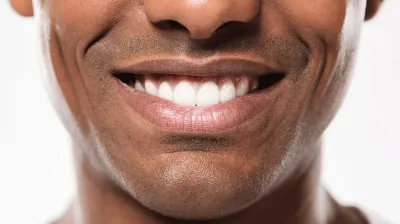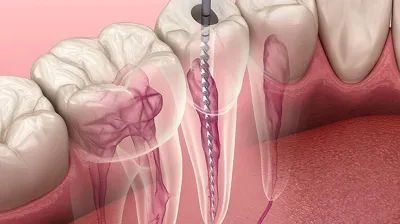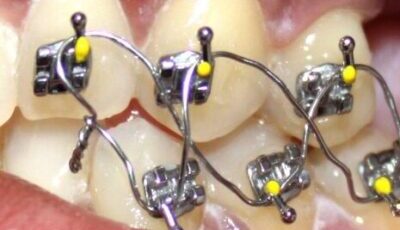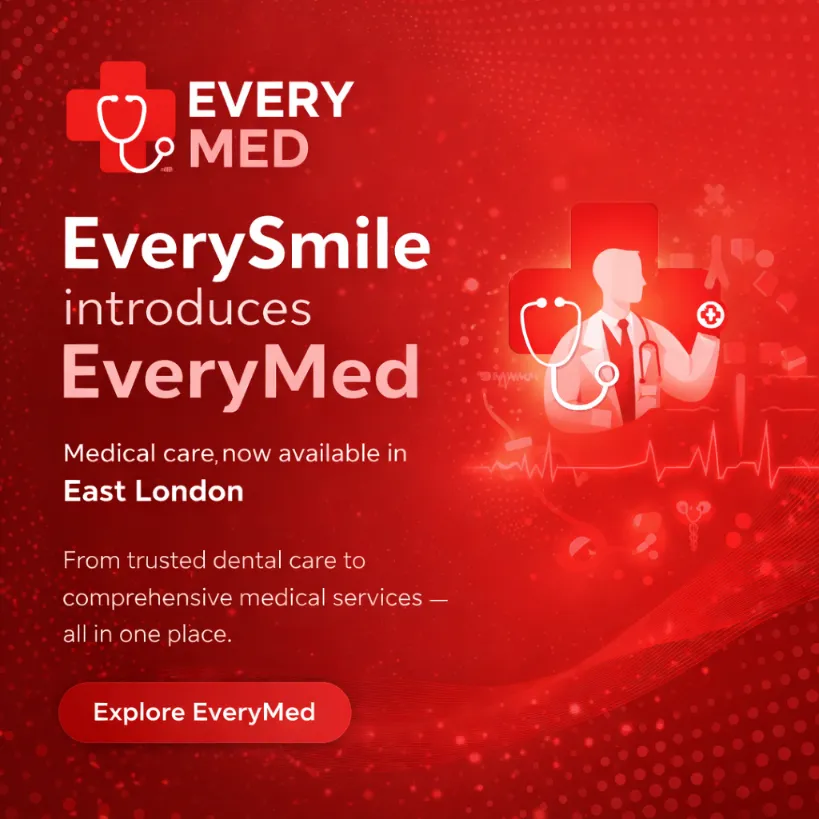Dental Crowns: Types, Procedure, Benefits & Cost
Every Smile Dentistry provides professional Cosmetic Dental Care to make your smile look its best. We want you to be happy with your smile, so we are dedicated to making sure that your dental results are natural-looking, life-changing and long-lasting.
Patient-Centered Care
Tailored, comfortable dental services for every individual smile.
All Medical Aids Welcome
Quality dental care made accessible by accepting all medical aids.
Transparent Pricing
Exceptional care at honest prices, ensuring value for every patient.
Providing Quality Dental Care With Experienced Doctors
Get a dental health checkup with a dentist that has your best interest in mind and offers fair rates.
1. Book An Appointment
Visit our website and book an appointment with one of our experienced dentists.
2. Come In For A Consultation
Our team will sit down with you and discuss your dental needs and goals.
3. Get The Perfect Smile
We’ll work with you to develop a treatment plan that will get you the perfect smile.
What Are Dental Crowns?
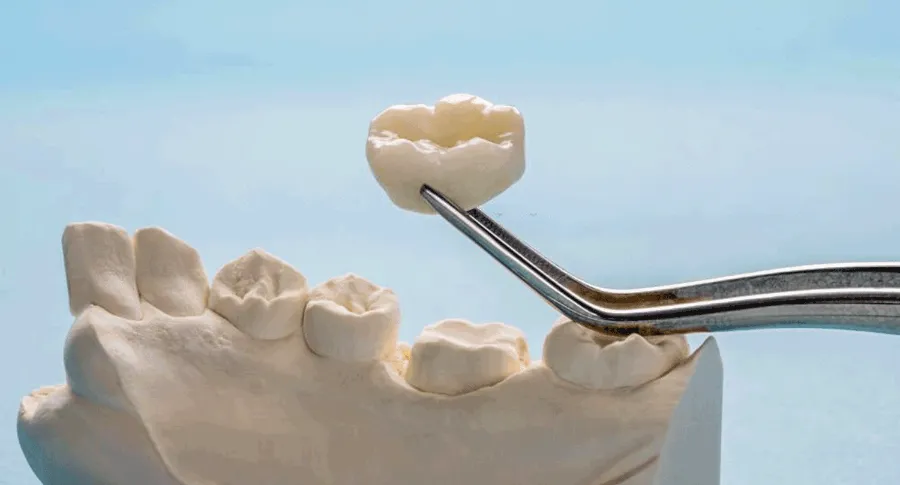
Dental crowns are a type of restoration used to cover and strengthen a tooth that has been damaged or weakened. The crown is cemented over the entire visible portion of the tooth, including the biting surface.
Dental crowns are made to match your natural teeth in size, shape, color and feel. They can be made from porcelain, metal alloys or a combination of both to achieve the most natural look possible.
The procedure for fitting a dental crown usually takes two visits to the dentist.
In the first visit, we’ll take an impression of your teeth and send it to our laboratory where a custom-made temporary crown will be made for you to wear until your permanent crown is ready.
On your second visit, we’ll remove the temporary crown and bond it permanently in place with dental cement so that your new smile looks natural and feels natural too!
When selecting a crown, it’s crucial to take into account a number of criteria, such as:
- cost \strength \durability
- You could also place importance on having a natural appearance that doesn’t take away from your grin. A dentist can explain the numerous choices and assist you in determining which one best suits your needs.
A crown may be needed for a variety of reasons, including:
- It protects weak teeth (which may have caries) from breaking, or holds weak teeth together when part of it breaks.
- Restoration of broken or badly worn teeth.
- Covers and supports teeth with heavy fillings and few remaining teeth.
- Holds the dental bridge in place.
- Cover deformed or severely discoloured teeth. cover dental implants
- It is placed over a tooth that has undergone root canal treatment.
Different Types Of Dental Crowns
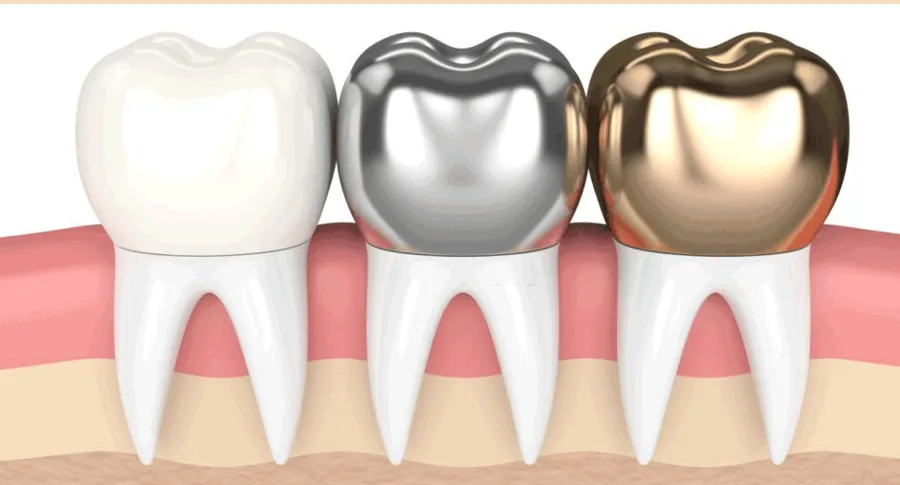
Dental crowns are made of metal, ceramic and porcelain, or a combination of all three. The metal can be gold, porcelain-fused-to-metal, or alloys of alloys.
The porcelain is generally feldspathic porcelains, though it can be other materials such as quartz and glass.
Metal Crowns
The metal material used in dental crowns is very strong and can withstand the forces that come with chewing and grinding.
The tooth to be covered by the crown will be ground down to make room for the crown to fit over it, but this doesn’t weaken it too much.
Ceramic Crowns
Ceramic dental crowns are also powerful, but require less grinding than metal dental crowns because they are lighter.
Glass and quartz are even more delicate than ceramic, so they require less grinding than ceramics do and are often used in front teeth where there isn’t much room for error because of their location on your face and jawline.
Porcelain Crowns
Porcelain-fused-to-metal dental crowns are made with a porcelain layer fused to a metal base.
The porcelain layer provides colour and shape, while the metal provides strength and durability.
These are popular because they are strong enough to withstand chewing forces, but they also look natural because they match your natural teeth in color, shape, and size.
Your dentist will take the following into account when choosing the material for your crown:
- where your tooth is
- if you grin, how much of the tooth will be visible
- location of your gums, the tooth that needs a crown, and its function
- how much natural tooth is still present, and what the adjacent teeth are like
Dental Crown Procedure
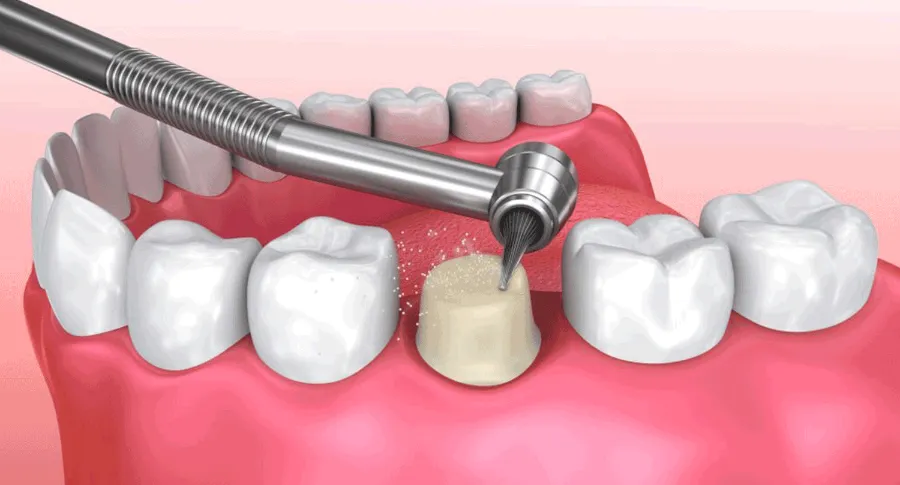
The process lasts several days with for temporary crown:
Two trips to the dentist are necessary for a conventional crown.
- The tooth that requires a crown is examined and prepared by the dentist. X-rays of the tooth may be necessary in this situation. Additionally, they could make a mould of your mouth or teeth first.
- Your dentist will file down and scrape away a portion of the tooth’s enamel.
- Your trimmed tooth and the teeth on each side of it will both be captured in an imprint.
- The dentist will place a temporary crown over your tooth to safeguard it.
- They deliver the imprint to a laboratory where the crown is made. This process might take a few weeks.
You’ll have a second appointment after the crown is placed so your dentist can seal it.
The same-day process:
You can omit the temporary crown stage if you have a same-day operation.
- Your mouth is captured digitally by the dentist.
- The dentist makes the crown right there in the clinic using the digital scan from the pictures. The crown may not be ready for approximately an hour or two.
- Your dentist places the crown in place after it is complete. The entire operation lasts between two and four hours.
Depending on your position, you might even be able to return to work while you’re waiting.
Not all dentists have the equipment necessary to create crowns in one day.
Whether you don’t have dental insurance, in particular, ask your dentist if this option is accessible and what the expected cost is.
Add Your Heading Text Here
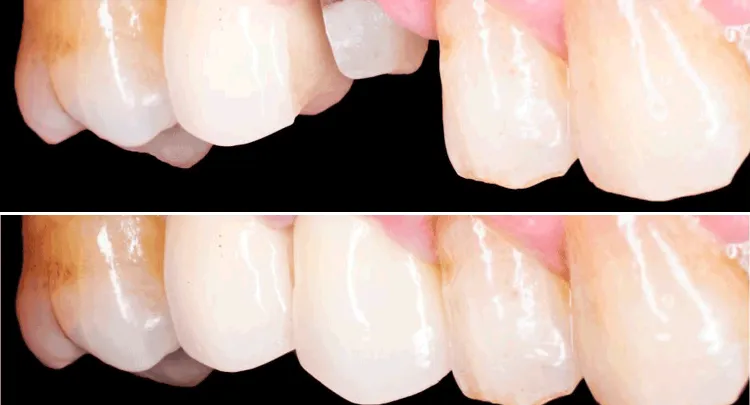
Problems That Can Occur As A Result Of Dental Crowns
There are several side effects that may arise from the use of dental crowns. These include:
- Tooth sensitivity: The root structure of your tooth is left exposed after the crown is placed, which can cause you to experience pain when you eat or drink hot or cold foods and drinks. This pain can be treated through the use of sedatives, but this may not work for everyone.
- Headache: Your bite will change as a result of having dental crowns installed, which may cause you to experience headaches after eating certain foods or drinking certain liquids (especially carbonated beverages). These headaches will pass once your bite adjusts itself to accommodate your new teeth.
- Jaw pain: As with any other surgical procedure, there is always a risk of infection following the installation process for dental crowns. If an infection occurs in this area, it could result in jaw pain or swelling that lasts longer than normal when eating.
How To Take Care Of Your Dental Crowns

Here are a few useful pointers:
- Brush carefully by practising. It’s time to start cleaning your teeth twice a day if you aren’t already. If your crown or the teeth surrounding it are sensitive to heat or cold, think about using a toothpaste designed for sensitive teeth.
- Daily flossing helps maintain all of your teeth in excellent condition.
- Skip the hard foods. If you have a porcelain crown, chewing ice or other hard foods may cause it to crack.
Your dentist could suggest a night guard if you grind or clench your teeth at night to protect your crown and neighboring teeth.
How much do crowns cost South Africa?
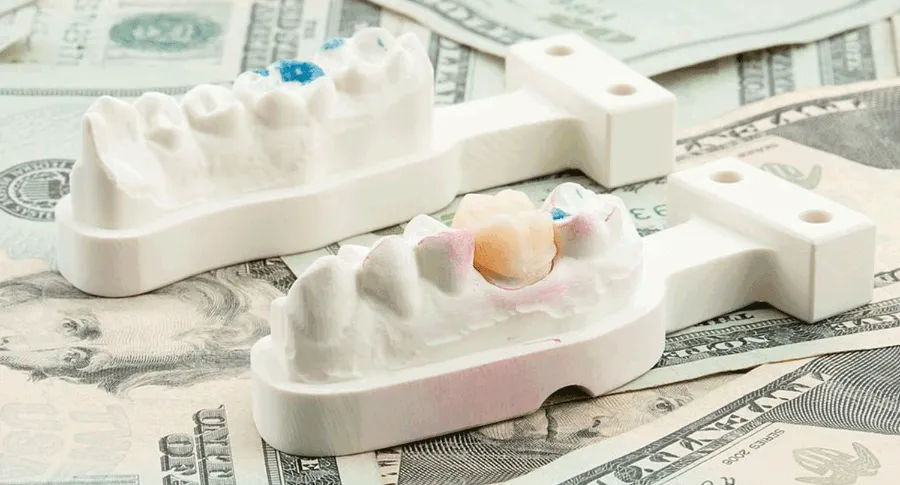
Depending on the material used for the crown and the size of the tooth, crowns can cost anywhere from R3,500 and R4,000, or possibly more.
A gold crown might cost you significantly more. Sometimes, all-metal crowns, which are composed of a metal alloy, are less expensive than crowns made of gold or porcelain.
Costs could also increase if the dentist needs to prepare the tooth more thoroughly before placing the crown.
For instance, you could require a dental implant or a root canal, both of which might increase the cost.
Your crown’s price may be fully or partially covered by dental insurance.
However, only specific crown types could be covered by your plan. To learn more about your insurance coverage, contact your provider.
To assist evaluate your dental expenditures, discuss with your dentist the many crown kinds that are available and suitable for your dental requirements.
Every Smile Dentistry Treatments
Every Smile Dentistry is a professional dental practice that includes General, Cosmetic, Aesthetic, and Emergency for you and your family with a team of experienced dentists and friendly prices.
Frequently Asked Questions
You can always submit a contact request if you have more questions or email info@everysmile.co.za
What Are The benefits For Dental Crowns?
Dental crowns are a type of restoration that is placed over the tooth to restore its original shape, size, and appearance. They can be used to restore a single damaged tooth or multiple teeth at once.
The procedure to place a dental crown involves removing decay from your tooth, shaping the tooth to fit into the crown, and then placing the crown over your tooth.
The benefits of dental crowns include:
- Improved aesthetics: A dental crown can cover up a discoloured or chipped tooth, making it look healthy and normal again.
- Improved function: Crowns can help keep your natural teeth from shifting out of place by providing support for them when they’re in need of extra strength.
- Longer lasting than other types of restorations: Dental crowns are made out of durable materials like porcelain or metal alloys that last longer than other types of restorations like fillings or veneers.
How long do crowns last?
Dental crowns typically last five to fifteen years. The amount of “wear and tear” crown experiences, how well you practice good oral hygiene, and your own mouth-related behaviours can all affect how long a crown will last. These oral habits may include the following:
- Your teeth are being ground or clenched.
- ice chewing.
- gnawing on one’s fingernails
- Make use of your teeth to open containers
Do crowns hurt?
No. We shall numb your mouth prior to placing your crown so that you won’t experience any pain as your tooth is prepared for the crown. For your full safety and comfort during your appointment at Shine Dental, we also provide sedation dentistry.
WHAT PEOPLE ARE SAYING ABOUT US
Don't just take our word for it.
EXCELLENTTrustindex verifies that the original source of the review is Google. I visited Every Smile Dentistry for the first time today and I am pleased with the service I received. The receptions was very warm and welcoming. I was attended to by Dr A Somtunzi who was also so friendly and welcoming. I had my teeth cleaned and a filling done. She gave a detailed explanation of what needed to be done. She was so gentle and I felt no discomfort at all. I’m happy with the work she did. Outside the excellent service, I think the thoughtful gesture of having ladies essentials in the rest room for everyone to use won my heartPosted onTrustindex verifies that the original source of the review is Google. Did a filling and washing of teeth. Amazing pain-free experience, user friendly from online booking to sitting on the dental chair. GQEBERHA branch treated me soft.Posted onTrustindex verifies that the original source of the review is Google. Haven't gone to the dentist in years so I was really nervous about this visit but the atmosphere in that office? So calm and so friendly. I would recommend this place to everyone, Sthabile Aphiwe Majola is definitely the kind of dentist everyone wants to have✨✨.Posted onTrustindex verifies that the original source of the review is Google. Best place ever,first the receptionist is so friendly and welcoming and the doctors are the best they make you feel comfortable before everything I would recommend them to anyone👌Posted onTrustindex verifies that the original source of the review is Google. The staff ,Dr Govender they are so friendly, they made me to feel very comfortable I would go there every time I want to do my teeth
Locations We Serve
Every Smile Dentistry offers a team of experienced dentists in South Africa in a variety of areas with friendly prices.

